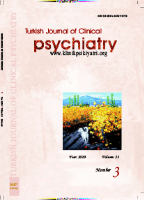
Schizophrenia
Scope & Guideline
Fostering Open Dialogue in Psychiatric Research
Introduction
Aims and Scopes
- Neurobiological Mechanisms:
Research focusing on the genetic, molecular, and neurophysiological aspects of schizophrenia, including brain imaging studies, gene expression analyses, and neuroinflammation. - Cognitive and Psychosocial Functioning:
Exploration of cognitive deficits, psychosocial factors, and their impact on patients' daily lives, including studies on social cognition, memory, and emotional processing. - Treatment and Management Strategies:
Investigation of pharmacological and non-pharmacological treatment approaches, including antipsychotic efficacy, cognitive remediation, and innovative therapeutic interventions. - Epidemiological and Sociocultural Factors:
Examination of the prevalence, incidence, and sociocultural influences on schizophrenia, including disparities in treatment access and outcomes. - Longitudinal and Developmental Studies:
Longitudinal research examining the progression of schizophrenia and its early indicators, particularly in at-risk populations and youth.
Trending and Emerging
- Integration of Digital Health and Technology:
The use of digital phenotyping and telehealth interventions is increasingly prominent, reflecting the growing interest in leveraging technology for monitoring and treating schizophrenia. - Microbiome and Gut-Brain Axis Research:
Studies exploring the relationship between gut microbiota and schizophrenia are emerging, indicating a shift towards understanding the biological underpinnings of the disorder from a holistic perspective. - Neuroinflammation and Immune Responses:
There is a growing focus on the role of neuroinflammation and immune dysregulation in schizophrenia, highlighting the need for research into novel therapeutic targets. - Machine Learning and AI in Diagnosis:
The application of machine learning and artificial intelligence in the diagnosis and treatment of schizophrenia is on the rise, indicating a shift toward data-driven and precision medicine approaches. - Cultural and Sociopolitical Contexts of Schizophrenia:
Research examining the sociocultural and political dimensions of schizophrenia, including stigma and health disparities, is gaining momentum, reflecting a broader understanding of the disorder's societal implications.
Declining or Waning
- Historical Perspectives on Schizophrenia:
Research focusing on historical or retrospective analyses of schizophrenia has become less prominent, possibly as the field moves toward more contemporary and innovative studies. - Traditional Psychotherapeutic Approaches:
Explorations of conventional psychotherapeutic methods appear to be waning as the focus shifts to evidence-based, integrative approaches and newer therapeutic modalities. - Single-Cause Explanations:
The trend towards viewing schizophrenia as a multifactorial disorder has reduced the publication of studies that emphasize singular causes, whether genetic, environmental, or psychological.
Similar Journals

BJPsych Open
Innovative insights for contemporary psychiatric challenges.BJPsych Open, published by Cambridge University Press, is a leading open access journal dedicated to the field of psychiatry and mental health. Since its inception in 2015, the journal has provided a platform for disseminating cutting-edge research and evidence-based practices, making significant contributions to the academic community. With an impressive impact factor and currently ranking in the top Q1 quartile of its field, BJPsych Open is recognized for its rigor and relevance, ranking 138 out of 567 journals in psychiatry and mental health according to Scopus, placing it in the 75th percentile. The journal's commitment to open access enhances visibility and accessibility, ensuring that vital research is available to a global audience. Researchers, professionals, and students alike will find valuable insights into contemporary mental health challenges and innovative treatment approaches, making BJPsych Open an essential resource for advancing mental health scholarship.

Neuropsychopharmacology Reports
Connecting research to practice in clinical psychology and psychiatry.Neuropsychopharmacology Reports is a leading open-access journal published by WILEY, dedicated to advancing the fields of clinical psychology, pharmacology, psychiatry, and mental health. Established in 2018, the journal aims to disseminate high-quality research findings, critical reviews, and innovative methodologies that elucidate the complexities of neuropsychopharmacology in enhancing mental health outcomes. With an impressive impact indicated by its Q2 rankings in several categories including Clinical Psychology and Pharmacology (medical) as of 2023, Neuropsychopharmacology Reports stands out as a vital resource for researchers, professionals, and students keen on exploring the interplay between pharmacological interventions and psychological well-being. The journal’s open-access nature ensures that critical advancements in this rapidly evolving field are readily available to a global audience, fostering collaboration and discourse among scholars and practitioners alike. Building on its indexed status with Scopus, the journal is positioned as a noteworthy contributor to ongoing discussions and developments in psychiatry and medical pharmacology.

Annals of Indian Psychiatry
Fostering Dialogue for a Comprehensive Understanding of Mental HealthAnnals of Indian Psychiatry is a premier journal dedicated to the field of mental health and psychiatry, published by Wolters Kluwer Medknow Publications. As an Open Access journal since 2017, it provides a platform for disseminating high-quality research articles, clinical studies, and reviews that address the diverse aspects of psychiatric disorders, treatment methodologies, and mental health policy in India and beyond. The journal aims to bridge gaps in the existing literature, support practitioners with evidence-based insights, and foster dialog among researchers in the psychiatric community. With an emphasis on innovative approaches and culturally relevant practices, the Annals of Indian Psychiatry serves as a vital resource for psychiatrists, psychologists, social workers, and students engaged in clinical practice and academic research. Its commitment to improving mental health outcomes in diverse populations makes it a significant contributor to the global discourse on psychiatric health.

Behavioral and Brain Functions
Pioneering Research in Behavioral NeuroscienceBehavioral and Brain Functions is a leading Open Access journal published by BMC, dedicated to advancing the field of behavioral neuroscience, cognitive neuroscience, and biological psychiatry since its inception in 2005. This esteemed journal, based in the United Kingdom, has established itself as a vital resource for researchers and professionals, boasting a remarkable influence demonstrated by its Q1 and Q2 rankings across multiple relevant categories. With its commitment to providing unrestricted access to high-quality research, the journal facilitates the dissemination of significant findings in understanding the complex interactions between behavior and brain function. The journal ranks impressively within the Scopus database, positioning itself among the top-tier publications in its categories, making it an essential platform for academic discourse and innovation. As it converges through 2024, Behavioral and Brain Functions continues to play a crucial role in shaping the forefront of neuroscientific inquiry, inviting contributions that challenge our understanding and promote further exploration in these dynamic fields.

Schizophrenia Research
Advancing understanding in schizophrenia research.Schizophrenia Research is a premier academic journal focused on innovative research within the domain of psychiatry and mental health, published by Elsevier. With its ISSN 0920-9964 and E-ISSN 1573-2509, the journal has established a strong presence since its inception in 1988, evolving to publish cutting-edge findings up to 2024. Positioned in Q1 in Psychiatry and Mental Health and Q2 in Biological Psychiatry, it ranks impressively in the 83rd percentile among its peers, according to Scopus, ranking #93/567 in the field of Medicine, and #12/51 in Neuroscience. This journal serves as a vital platform for the dissemination of significant scientific advancements and theoretical insights into schizophrenia, fostering a deeper understanding of mental illnesses. Although it operates on a subscription basis, its critical role in informing both ongoing research and clinical practices cannot be overstated, making it an essential resource for researchers, clinicians, and students alike. Join a global community dedicated to improving mental health outcomes and advancing the study of schizophrenia through this reputable publication.

Biological Psychiatry-Cognitive Neuroscience and Neuroimaging
Transforming Psychiatric Research with Innovative TechniquesBiological Psychiatry-Cognitive Neuroscience and Neuroimaging is a leading interdisciplinary journal published by Elsevier, focusing on the convergence of biological psychiatry, cognitive neuroscience, and advanced neuroimaging techniques. With its prestigious Q1 rankings across essential categories such as Biological Psychiatry, Cognitive Neuroscience, and Neurology (clinical), this journal is at the forefront of research that examines the complexities of mental health through innovative methodologies. Covering a broad spectrum of topics from neurobiological mechanisms to clinical applications, it aims to provide a platform for scholars and practitioners to exchange insights on mental disorders and their neurobiological underpinnings. The impact factor and Scopus rankings further underscore its importance, with rankings highlighting its position in the top percentiles of related disciplines. By fostering an open exchange of ideas and promoting cutting-edge research, this journal is an essential resource for researchers, professionals, and students dedicated to advancements in the understanding and treatment of psychiatric and neurological conditions.

BMC Psychiatry
Empowering minds with groundbreaking psychiatric studies.BMC Psychiatry is a leading open-access journal published by BMC, dedicated to advancing the field of psychiatry and mental health. With its E-ISSN 1471-244X, the journal has been at the forefront of disseminating high-quality research since its inception in 2001, and it proudly maintains a Q1 ranking among psychiatry and mental health journals, reflecting its significant impact and relevance within the research community. Based in the United Kingdom, BMC Psychiatry boasts a commendable Scopus ranking of #158 out of 567 in the psychiatry and mental health category, placing it in the 72nd percentile. The journal serves as a vital platform for scholars, clinicians, and students alike, providing them with access to groundbreaking studies, innovative methodologies, and emerging trends in mental health. By fostering a collaborative environment, BMC Psychiatry not only enriches the academic landscape but also contributes to evidence-based practice and policy in mental health care.

Klinik Psikiyatri Dergisi-Turkish Journal of Clinical Psychiatry
Exploring the Depths of Psychiatry and Mental WellnessKlinik Psikiyatri Dergisi - Turkish Journal of Clinical Psychiatry is a distinguished open-access journal dedicated to the evolving field of psychiatry and mental health. Published by KLINIK PSIKIYATRI DERGISI in Turkey since 1998, this journal aims to provide a platform for the dissemination of research, clinical studies, and reviews that contribute to the understanding of psychological disorders and treatment methodologies. With an ISSN of 1302-0099 and an E-ISSN of 2146-7153, the journal is indexed in various databases, although it currently holds a rank of 460/567 in the Scopus ranking for the category of Medicine: Psychiatry and Mental Health. The journal operates under an open-access model, ensuring that research findings are readily accessible to a wide audience, contributing to greater knowledge and awareness in the field. As it converges from 2017 to 2024, Klinik Psikiyatri Dergisi continues to strive for excellence, providing valuable insights and resources for researchers, professionals, and students interested in the complexities of mental health.

Noropsikiyatri Arsivi-Archives of Neuropsychiatry
Unveiling Insights into Psychiatric DisordersNoropsikiyatri Arsivi-Archives of Neuropsychiatry is a prominent scholarly journal dedicated to advancing knowledge in the fields of neuropsychiatry and mental health. Published by the Turkish Neuropsychiatry Association, this journal aims to disseminate high-quality research that contributes to a deeper understanding of psychiatric disorders, innovative treatment modalities, and interdisciplinary approaches in neuroscience. Based in Turkey, the journal has been in circulation since its inception, with a rich history reflecting its commitment to addressing contemporary issues in mental health care. It is currently indexed under Scopus, with notable rankings in both Psychiatry and Mental Health (Rank #378/567, 33rd Percentile) and General Neuroscience (Rank #97/113, 14th Percentile), highlighting its increasing relevance and impact in the academia. Although it is not currently an open access journal, its contributions remain vital for researchers, professionals, and students who wish to stay abreast of the latest developments and research in neuropsychiatry.

PSYCHIATRY AND CLINICAL NEUROSCIENCES
Pioneering Insights in Psychiatry and Clinical NeurosciencesPSYCHIATRY AND CLINICAL NEUROSCIENCES is a leading journal in the fields of psychiatry and clinical neurology, published by Wiley. With a commendable impact factor and a position within the prestigious Q1 quartile across multiple relevant categories—including Medicine (Miscellaneous), Neurology, and Psychiatry and Mental Health—this journal stands out for its rigorous peer-reviewed content that addresses critical issues in mental health and neurological disorders. Established in 1933, the journal has a rich history of contributing impactful research that guides both clinical practice and academic inquiry. Although it is not an open-access journal, its high relevance is underscored by its Scopus rankings, with notable percentiles in Psychiatry and Neurology, making it a vital resource for researchers, clinicians, and students looking to stay abreast of the latest advancements. Located in the United Kingdom, PSYCHIATRY AND CLINICAL NEUROSCIENCES aims to bridge the gap between theory and practical application, fostering a comprehensive understanding of the complex interplay between mental health and neurological conditions.